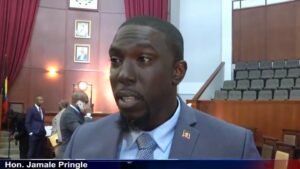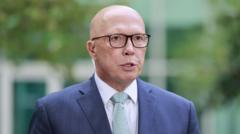As Tanzania prepares for its elections, the main opposition party Chadema faces disqualification, largely due to treason charges against its leader, Tundu Lissu, amplifying concerns about electoral fairness and political repression under the ruling CCM party.
Tanzania’s Opposition Party Excluded from Upcoming Elections Amid Political Turmoil

Tanzania’s Opposition Party Excluded from Upcoming Elections Amid Political Turmoil
Chadema barred from election participation following treason charges against its leader, intensifying scrutiny of President Hassan's governance.
Tanzania's primary opposition party, Chadema, has been declared ineligible to participate in the upcoming elections, further intensifying the ongoing political crisis in the nation. This announcement came shortly after Chadema’s leader, Tundu Lissu, was arrested and charged with treason, casting a shadow over what many perceive as an increasingly authoritarian regime. Ramadhani Kailima, the director of elections at the Independent National Elections Commission, confirmed the party’s disqualification resulting from its failure to sign a crucial code of conduct document by the required deadline.
Lissu was charged following a rally in southern Tanzania where he advocated for electoral reforms. His treason charges, described by his lawyer as politically motivated, mark yet another chapter in a history of conflict between Lissu and the ruling Chama Cha Mapinduzi (CCM) party. The CCM has been in power for nearly six decades, and Lissu’s arrest may significantly bolster the ruling party’s chances of retaining its grip on power as the elections draw near.
The electoral commission clarified that any party neglecting to sign the code of conduct would be barred from participating, including any future by-elections until 2030. This move comes on the heels of claims from campaigners and opposition factions accusing President Samia Suluhu Hassan's government of ramping up pressure against political adversaries, despite earlier promises of reform after she succeeded the late President John Magufuli in 2021.
Lissu has staunchly pushed for changes in the electoral framework, emphasizing that free and fair elections cannot occur without significant alterations in how the electoral commission operates. He contends that the makeup of this body is overly influenced by the current administration. Authorities accuse him of attempting to sow dissent, which has led to his remand in custody as his case awaits an April hearing.
Historically, Lissu has faced numerous challenges, including a 2017 assassination attempt and multiple arrests, culminating in his lengthy periods in exile. His recent return to Tanzania was seen as a move to engage with Hassan's administration, which has been perceived as attempting to grant more leeway to opposition parties. Nevertheless, the ongoing developments signal continuing tensions and challenges to democracy within the east African state.




















